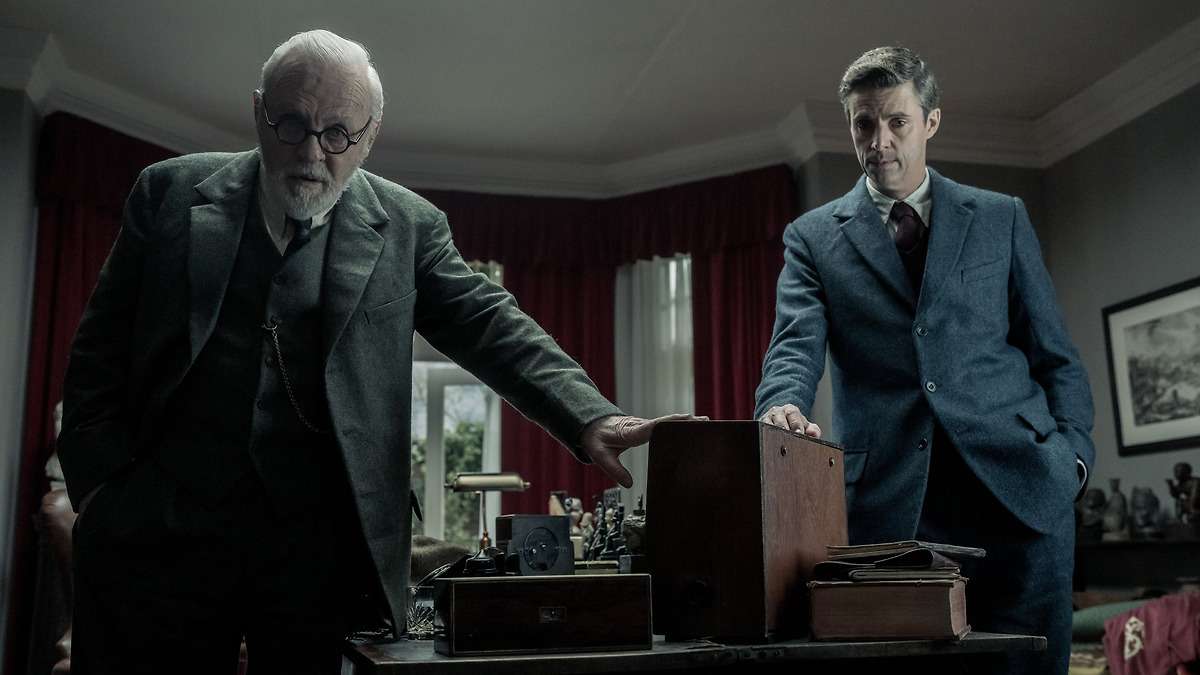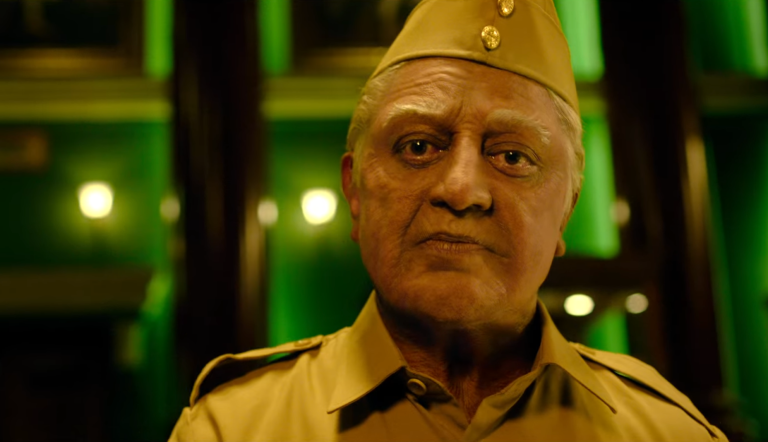“Freud’s Last Session” is a cinematic adaptation of the stageplay written by Mark St. Germain that goes by the same name. The film imagines the two prolific minds of the 20th century, a curmudgeonly Sigmund Freud and suave C.S. Lewis, meeting at Freud’s London home and firing off wits at each other on a range of discourses surrounding sexuality, death, and God. The table also turns when Lewis destabilizes Freud and makes his way to his inner world.
This article will explore the major discussions that have come up in their purported rendezvous.
Freud’s Last Session (2023) Plot Summary & Movie Synopsis:
London, September 3, 1939
It has been over a year since Freud left the Nazi-occupied Vienna. It is two days after German forces invaded Poland. Sigmund Freud informs his daughter, Anna, that he is expecting an Oxford don. This Oxford don is Professor C.S. Lewis, who Anna describes as the ‘Christian apologist.’ Anna Freud is in a relationship with a woman, Dorothy Burlingham. Anna insists on bringing Dorothy to their house so that they can stay together, given the highly hostile situation in London. Freud politely but condescendingly dismisses Anna’s proposal. Her father’s constant dismissal evidently irritates and disheartens Anna.
Freud reminds her of Einstein’s visit and the discussion with him on the true indication of insanity. Freud says that the true indication of insanity lies in repeating something over and over again and expecting the same result. This is perhaps a hint for Anna to pick as she has been broaching the topic of bringing Dorothy home and facing rejection from Freud’s end. Anna, in reply, proclaims that the surest indication of sanity would be if one chooses to change their mind about something, this time a hint for Freud to pick. It is also shown that Freud has to take morphine frequently for his mouth pain, which later is revealed as being caused by oral cancer.
On the other hand, we see C.S Lewis setting out to meet Freud despite his partner’s reluctance. At the station, the sight of trains filled with children who are being evacuated to the countryside profoundly impacts him. When C.S Lewis arrives, Freud softly jibes at him for being late. He lets Lewis know that the meeting will be brief. Freud had written to C.S Lewis and invited him from Oxford for a chat after reading the latter’s book, Pilgrim’s Regress. But Freud seems not too moved by the book. Lewis believes that Freud is offended by the things that he has written, especially by Lewis’ satirizing of Freud through one of the characters.
Lewis says that he is here to challenge Freud’s worldview as it completely negates his worldview. He is a staunch believer in the existence of God and refuses to believe that believers can simply be tagged as suffering from obsessional neurosis. This proclamation irks Freud a little. Things quickly turn heated as they both start taking turns to make jibes at each other. Freud’s belief that the concept of God is ludicrous does not sit well with Lewis.
How do the two men encounter longing in their childhood?
C.S. Lewis begins by saying that he buried the faith of his younger days with his mother when she died. His mother’s death left his father so grief-stricken that he lost touch with his surroundings. He felt the only solution would be to send off his boys to the boarding school. This turned out to be Lewis’ greatest trauma in his life, which affected him more than the war could ever do.
On his next birthday, his brother, Warren, gave him a present that he describes as “the most wonderful present he had ever been given.” It was a toy forest crafted in a biscuit tin box. This present evoked in him a singular feeling that he had never experienced before: joy. It transported him to a new world where he could see the stag come alive.
Freud says that our deepest cravings can hardly be satisfied or identified. There is a German term for longing – Sehnsucht. Freud narrates his own experience of longing when he developed a deep desire to walk in the woods. Freud escaped his father and ran into the inner depths of a forest. He tells Lewis that the freedom to be alone in the forest, where he was most at peace with himself and the world, surpassed the anxiety of being alone with his father, nowhere in sight. Both men dwell on the repercussions of the father figures in their respective lives.
Why does Lewis get traumatized?

An air raid siren goes off, and the two men quickly leave Freud’s house to take momentary shelter in the cellar of the local church. The claustrophobic passageway to the cellar brings back to Lewis’ mind the traumatic memory of his years serving in the trenches. Freud alleviates a severely traumatized Lewis by bringing him back to the present. Later, Freud’s ability to identify Saint Dymphna when the Father of the church failed to recognize her astonishes Lewis.
What ignites Lewis’ fascination with Christianity?
While having a walk with Tolkien, who is known most widely as a devout Christian, Lewis spots a stag again. Lewis, who is not yet swayed by the fervor of Christianity, describes the Bible as a fictional anthology of myths and legends. To this, Tolkien replies that the myth of Christ is no fictional myth as he walked the earth amongst typical people. His death testifies that the myth is actually the truth. Tolkien’s devotion as a scholar startles Lewis and causes him to ask if Tolkien has no obligation to the truth. Tolkien advises Lewis to examine the evidence of the existence of Christ and do his own research to find out the truth. Thus, Lewis spends hours poring over books to find out the truth, which ultimately makes him a devout believer.
Freud laughs at this and says that Lewis has become certain of Christ’s existence because of bad storytelling. To this, Lewis says that Christ’s existence is not up for debate, as even his contemporaries have also recorded the reality of his existence. He just hopes to resolve the enigma surrounding who he was. Freud settles the discussion by asking Lewis to give him one reason that would compel him to take Christ’s claim to be God more seriously than his patients’ claim that they are Christ. In a roundabout manner, Freud, who calls these patients “raving lunatics,” ends by saying that Lewis and his friends must also have a mental condition for believing so ardently in these ham-fisted mythical stories.
What forced Freud to consider leaving Vienna finally?
Freud admits to his failure to gauge the monstrous repercussions that Hitler’s rule guaranteed. Despite his well-wishers and friends asking him to leave Vienna urgently, Freud was adamant. He deemed that no place was fit for starting his life anew. It was not too long before the Gestapo arrived at their doorstep, and Anna valiantly asked them to take her instead of her sick father. When Anna is detained, she takes suicide pills with her. Anna’s detainment is the final blow for Freud as he moves away from Vienna shortly after that.
What does Freud see in his dream?
Although nothing is explicitly stated, the dream that Freud has where he can be seen moving through dark alleyways in a wheelchair can be a reference to his own theory of the oral stage. When Freud faces difficulty with his teeth prosthesis, Lewis asks who is there to help him usually. Freud says that only his daughter is allowed to touch it, not even the doctors.
Then, we are introduced to a dream-like sequence where Freud is being moved away in a wheelchair. He sees Anna and Dorothy making love. There is also a marble statue of Saint Dymphna, the patron saint of the mad and the lost, and a serpent coiling around it. He also sees his father. The space that unfolds before him is like a dark maze. He follows his boyhood self, who appears and reappears before him. The boy tries to put his hand into his mouth. Although Freud does not explicate what happened at the doctor’s chamber, this can be seen as a reference to Freud’s notion of oral fixation, the arousal that a person experiences from oral stimulation.
Why is Anna rebuked by the college authority?
After Freud’s doctor fails to show up, Freud calls Anna’s college and demands she be back home. Anna, who is in the middle of a lecture, dismisses the remaining classes. This irks her senior. He demands an answer from Anna for being so recklessly irregular with her lectures. Anna says that she has the greater responsibility of being with her father, who is in pain. Her senior chides her for not recognizing the unhealthy attachment disorder that she has formed by idolizing her father.
What view does Freud hold of homosexuality? What is the discussion between the two men on sexuality?
When Freud notices that Lewis is visibly uncomfortable when presented with the question of being in a relationship with either gender as a choice, he asserts that homosexuality is not immoral. According to Freud, moral sense in a man is a result of fear, which comes from the castration complex. Without fear, impulses cannot be countered.
The sight of Freud smoking a cigar, despite his cancer, surprises Lewis. But Freud assures that he has allowed himself to indulge in this only remaining ‘sexual’ pleasure. He sarcastically describes it as a regression to the ‘oral’ stage. The mention of ‘sexual’ for Lewis is reductive as he equates it with sex. However, Freud explains that any interaction that brings pleasure is inherently sexual.
To Freud, sexuality is the font of all happiness, and psychoanalysis is inherently sexual. Lewis states sex is only one of the ‘god-given’ pleasures, which again is fleeting. He presents a moralistic view on sex as something that should be maritally sacrosanct. Freud laughs and calls the Bible a bestiary of sexuality. He ends the discussion by separating lesbianism and homosexuality as having different points of departure. Moreover, Freud believes that lesbianism, if unchecked, can become more unstable.
What happens to Lewis in the trenches?

During his term in the army, Lewis formed a close bond with another soldier, Paddy. Paddy makes a pact with Lewis that if either died during the war, the survivor would take care of both of their families. Just before Paddy lays down his life at the battlefront, Lewis hallucinates a stag at the no man’s land. After Paddy’s death, Lewis keeps his promise of taking care of his mother. Janie Moore, Paddy’s mother, was the only person who visited the injured Lewis while he was at the hospital. Janie firmly tells Lewis that she is not in need of any guardian. Lewis proposes Janie look at the bond not as a guarantee of guardianship but as a friendship.
Freud is fascinated by Lewis’ fixation on his friend’s mother. He tries to probe it further and asks if he finds Janie attractive, but Lewis deflects by calling it a simple and personal bond that he is not ready to discuss in public. Freud remains interested because he feels men who have lost their mothers at a young age are prone to be attracted by mature women later in life.
What views do the two men have on death?
Freud’s cancer is inoperable. Freud reveals that he has made a pact with his doctor to terminate his life on his own accord. He reveals that he has not disclosed his secret pact with his wife as she too shares religious sensibilities, like Lewis, which deems suicide as a sin.
What does Freud reveal about Anna?
Lewis asks Freud if Anna is in a relationship with someone. Freud tries to deflect by saying that she does not have enough time for relationships. Lewis replies that it is only normal for Anna not to require a partner as she has all the stimulation she needs. Lewis underscores that Anna only shares a visible codependency on her father, especially as he only allows her to touch his mouth. Anna’s paper on sadomasochistic fantasies is very well-received. The truth of Freud being Anna’s analyst comes out. This is a particularly forbidding secret that has been hidden away as it was Freud who cautioned about the erotic charges that are always negotiating between the analyst and the patient.
Freud’s Last Session (2023) Movie Ending Explained:
Does Sigmund accept Anna and Dorothy?
Before leaving, Freud takes a departure from his usual helper and asks Lewis to help him remove the prosthesis from his mouth. Freud presents Lewis with a book. He meets Anna outside. Lewis notices that Anna is about to take Dorothy to live with her. Anna silently expresses her will to choose Dorothy as her partner, which Freud accepts. Lewis takes the train to Oxford. In a deep slumber, he finds himself back in the mystical forest of his childhood. He feels a deep sense of contentment. He also opens the present and finds the book The Pilgrim’s Regress with Freud’s words– “From error to error, one discovers the truth.”
The ending card says that Freud died shortly after, on September 23, 1939, with the assistance of Dr. Schur. C.S. Lewis went on to achieve fame for his BBC talks on Christianity during WWII. During the war, Lewis opened his doors for children evacuated from London. These children served as his inspiration for The Chronicles of Narnia. Anna, who became the founder of child psychoanalysis, lived with Dorothy for the next 40 years in Freud’s London home. The film also ends by saying that it is recorded that shortly before his death, Freud met an Oxford don. However, whether or not it was C.S. Lewis will forever remain unknown.







